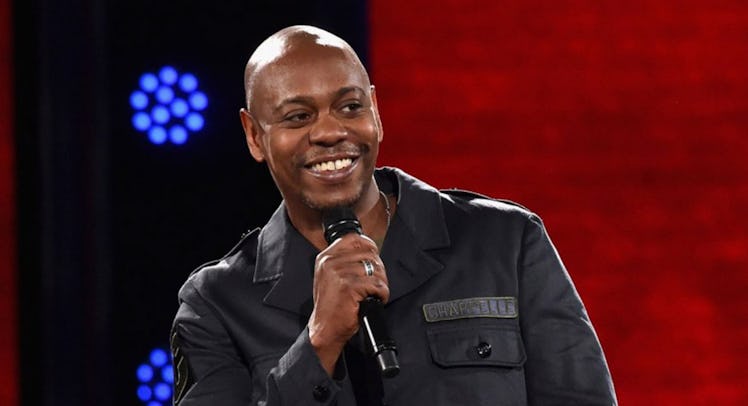Dave Chappelle’s Weird Fight for His Kids’ Right to Be Wrong
Is Chappelle a breath of fresh air in a stifled culture of political correctness? Or is he just an old man unwilling to evolve with the changing times?

It’s Dave Chappelle‘s first instinct, it seems, to grab the third rail. He famously joked about feeling bad for Michael Richards after the Seinfeld actor went on a racist rant and aired a skit sexualizing Sesame Street-style puppets. Chappelle has a particular talent for jokes that make it hard for an audience to know if they are laughing because they’re uncomfortable or if they’re uncomfortable because they’re laughing. Past being prelude, it’s no surprise that he directly addresses accusations of transphobia and sexism leveled against him in his new Netflix specials Equanimity and The Bird Revelation or that he’s broadly dismissive of any criticisms leveled against him. It is, however, slightly surprising that the foundation of his scattershot defense of his more problematic material is a civic argument about discourse and parenthood.
It’s worth noting that Chappelle was a groundbreaking comedian when he rose to prominence and that, in essence, his act hasn’t changed very much. He no longer plays the upstart or the underdog (it would be a bad look on a multi-millionaire), but he still operates in smart younger brother mode, challenging a self-selecting open-minded audience on their assumptions. However, this approach doesn’t go down as well as it once did or — more accurately put — this approach makes a backlash from activists and censorious (if righteous) elements of the left inevitable.
Chappelle never explicitly calls out “social justice warriors” but his material makes it clear that he isn’t the biggest fan of the so-called politically correct culture that has emerged over the last decade or so. The comedian is no conservative — and he’s certainly not looking to make America great again — but he is strongly of the opinion that people have become too sensitive. And that’s where the rubber hits the road from a parenting perspective. “Motherfuckers,” he says, addressing the comedians at the back of the club he’s playing in The Bird Revelation, “you have a responsibility to speak recklessly, otherwise my kids might not know what reckless talk sounds like, the joys of being wrong.”
Few parents will tell you they want their kid to be racist or sexist (a higher proportion might encourage homophobia), but many do question whether modern social justice movements’ policing of language is an effective way to fight bigotry or worth the cost to public discourse. Chappelle’s concern seems to be that demanding that conversations take a specific form and employ specific language limits space for organic, child-like curiosity and honest mistakes. As a comic, Chappelle has frequently played the role of street-smart toddler, wandering into big dialogues and asking insouciant and wrongheaded questions. Unlike many other comedians, he seems to embrace confusion and actively avoid resolution of any kind. He’s less like George Carlin, a liberal comic at perpetual war with political correctness, than he is like Mitch Hedberg, a stoner with some weird questions. But Chappelle insists on poking the bear.
If what Chappelle wants is for his kids to have the opportunity to voice their own bigotry in the form of dumb questions and receive, in turn, answers that traffic in the realness of experience rather than the selective vocabulary of evolving protest movements, well, that makes sense. But that’s not all he seems to want. He seems to want there to be safe spaces, to borrow a term from his antagonists, for reckless talk where people can be jerks. In Equanimity, he tells a story about hurting a trans fan’s feelings and feeling genuinely bad about it. Then he says that, as a rule, he refuses to feel bad about what he says on stage. He adds that the trans experience is “kind of fucking hilarious.” There is a pump-fake towards contrition but it is pretty clear that Chappelle wants to be able to say whatever he thinks is funny.
Will his kids live in a less funny world? It’s unclear. Research suggests that inclusive, PC cultures are more capable than less overtly respectful cultures of coming up with new ideas. So, from a creative perspective, that should be reassuring. But there’s no research on jokes and probably not enough data to calm parents concerned their children won’t be free to ask questions and make mistakes without profound ramifications. Understood in this context, Chappelle’s advocacy for the importance of wrongness and specifically the introduction of kids to wrongness and dumb ideas feels profound and understandable despite likely being ill-considered.
And then there’s the question a lot of people Chappelle’s age — and a lot of younger people too — end up having to face: Is this really a free speech argument at all or is Chappelle just too lazy to evolve with society? Obviously, it’s impossible to know and it would be irresponsible to presume one way or another. But there is always the sense, when the conversations arise, that part of the objection to PC culture is that it requires, simply put, more work than ignorance.
So, maybe Chappelle is wrong. Maybe this is what being wrong sounds like. Just don’t expect an apology. That ain’t gonna happen.